2024译林版高中英语必修第三册同步练习--Unit 4 Part 3 Extended reading, Project, Assessment & Further study
文档属性
| 名称 | 2024译林版高中英语必修第三册同步练习--Unit 4 Part 3 Extended reading, Project, Assessment & Further study | 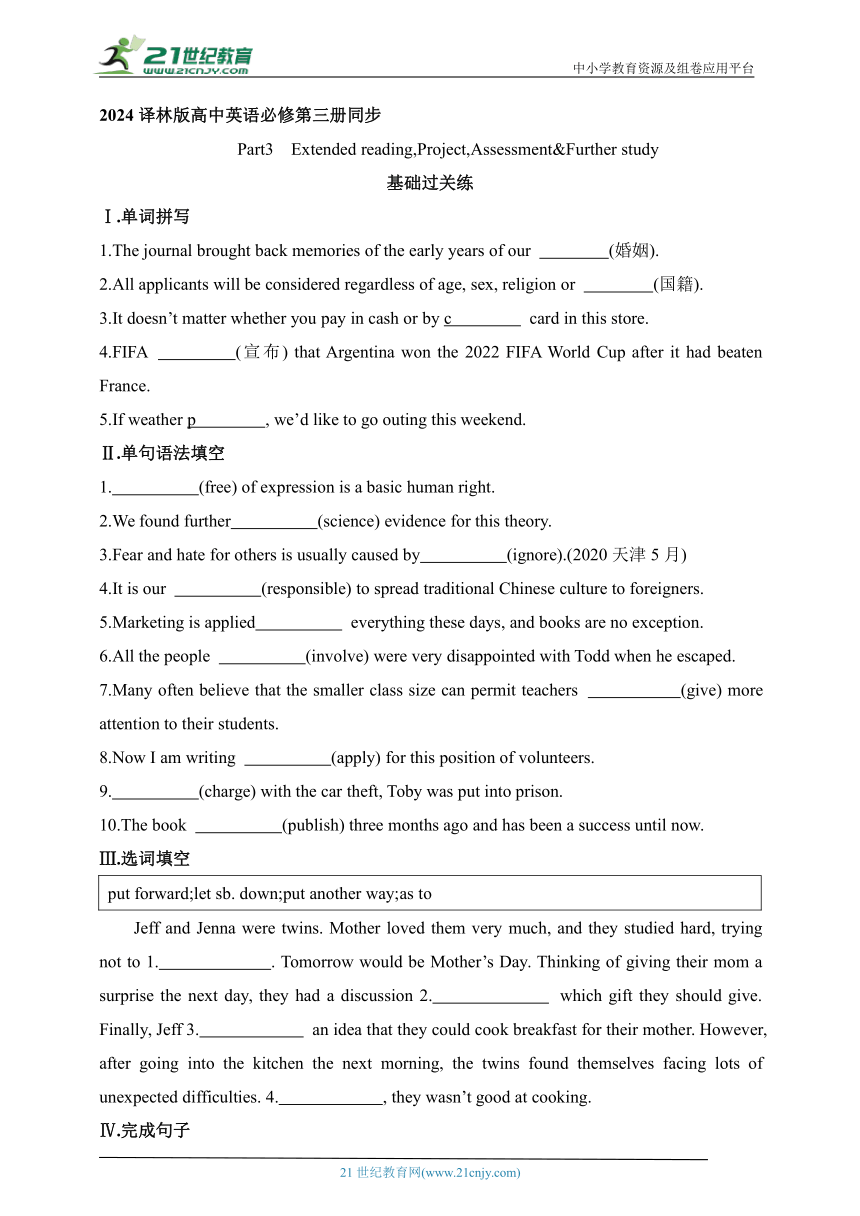 | |
| 格式 | docx | ||
| 文件大小 | 1.0MB | ||
| 资源类型 | 试卷 | ||
| 版本资源 | 牛津译林版(2019) | ||
| 科目 | 英语 | ||
| 更新时间 | 2023-11-13 15:16:40 | ||
图片预览

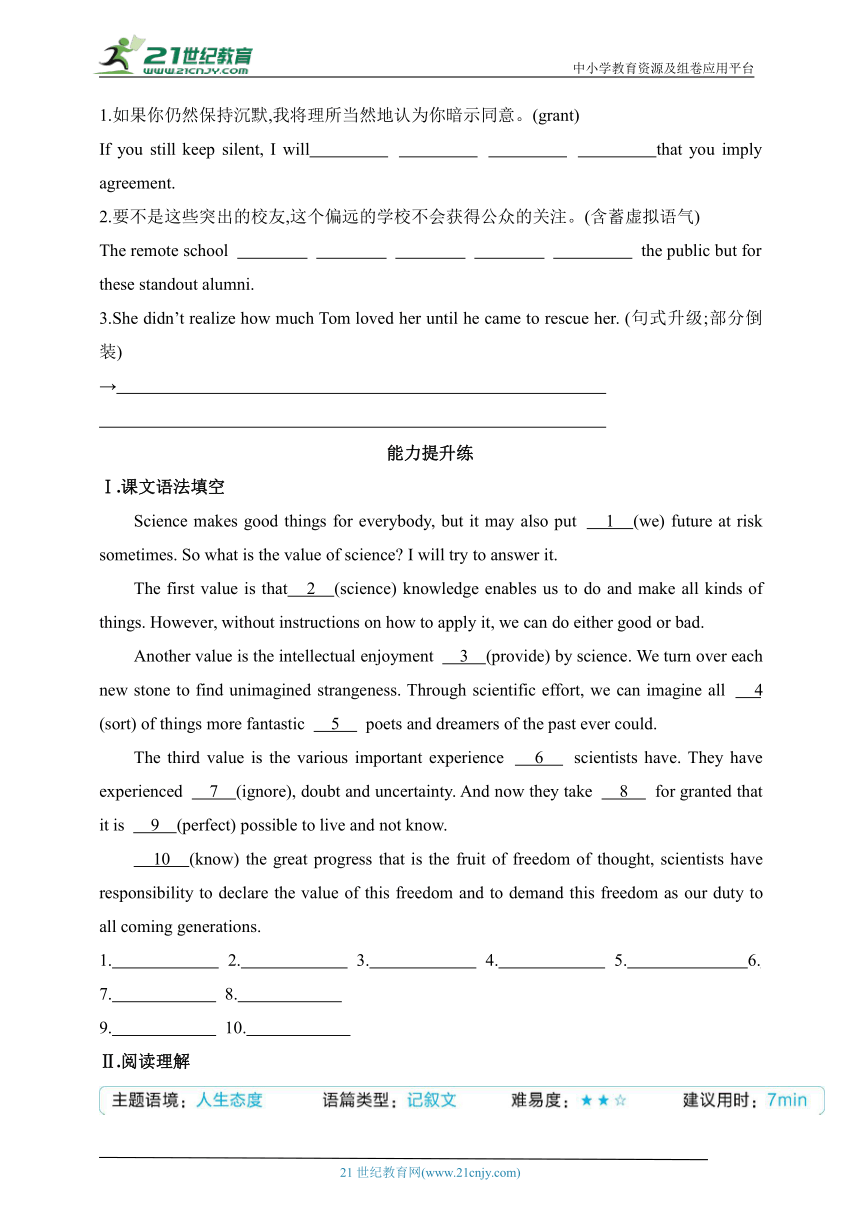
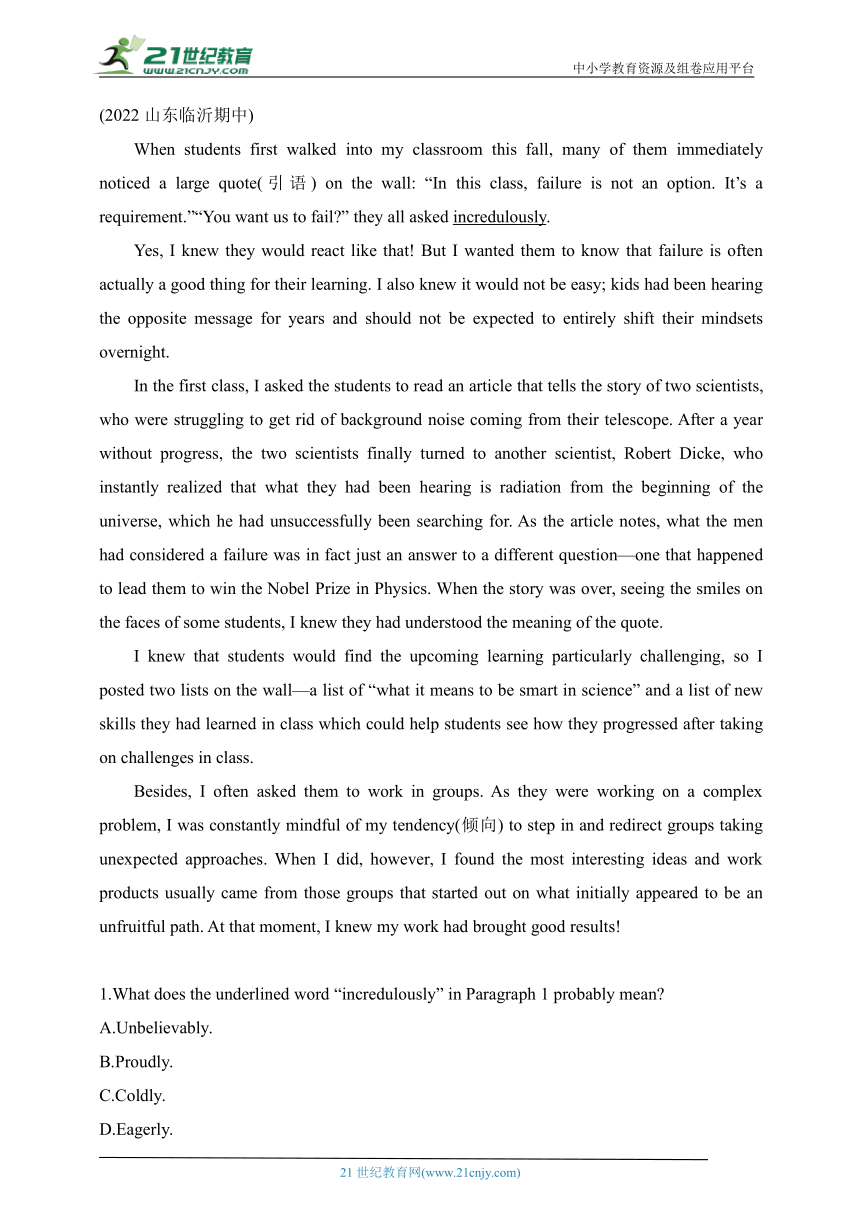
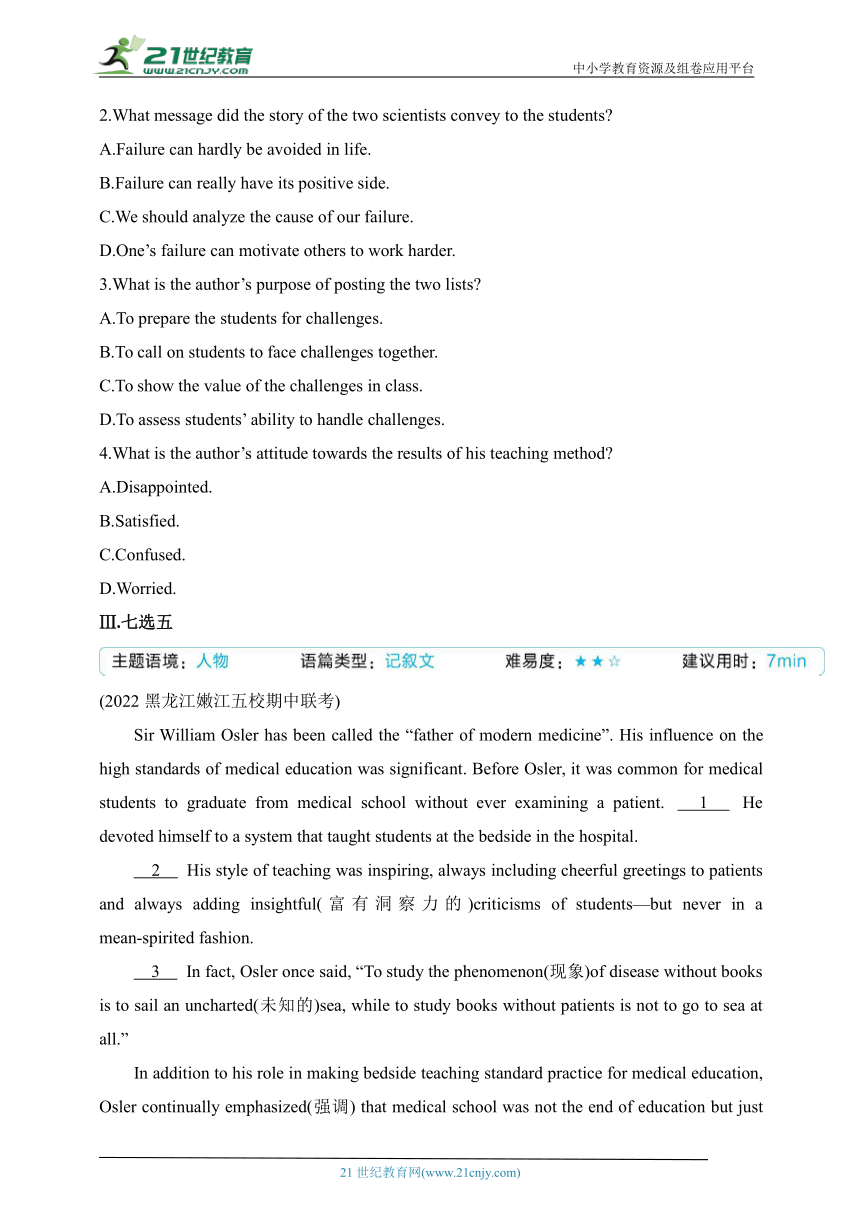
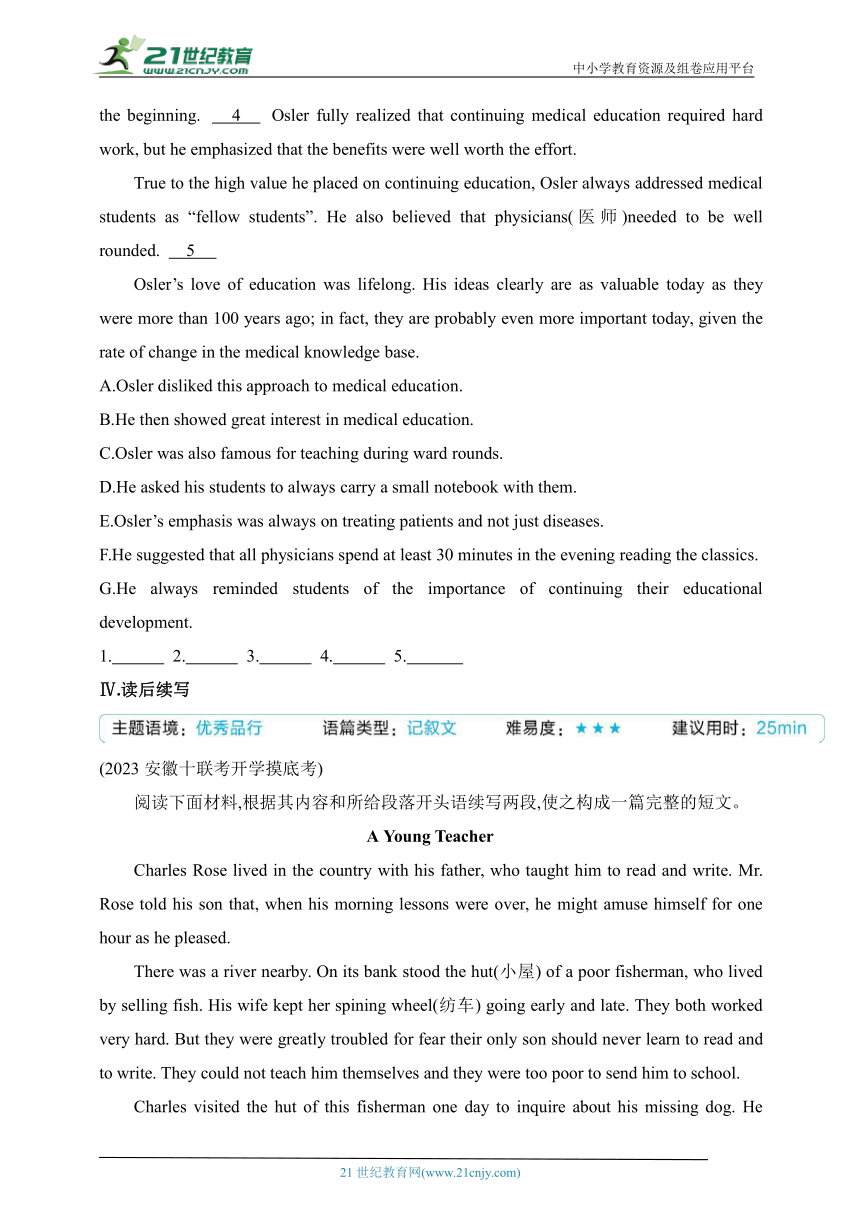
文档简介
中小学教育资源及组卷应用平台
2024译林版高中英语必修第三册同步
Part3 Extended reading,Project,Assessment&Further study
基础过关练
Ⅰ.单词拼写
1.The journal brought back memories of the early years of our (婚姻).
2.All applicants will be considered regardless of age, sex, religion or (国籍).
3.It doesn’t matter whether you pay in cash or by c card in this store.
4.FIFA (宣布) that Argentina won the 2022 FIFA World Cup after it had beaten France.
5.If weather p , we’d like to go outing this weekend.
Ⅱ.单句语法填空
1. (free) of expression is a basic human right.
2.We found further (science) evidence for this theory.
3.Fear and hate for others is usually caused by (ignore).(2020天津5月)
4.It is our (responsible) to spread traditional Chinese culture to foreigners.
5.Marketing is applied everything these days, and books are no exception.
6.All the people (involve) were very disappointed with Todd when he escaped.
7.Many often believe that the smaller class size can permit teachers (give) more attention to their students.
8.Now I am writing (apply) for this position of volunteers.
9. (charge) with the car theft, Toby was put into prison.
10.The book (publish) three months ago and has been a success until now.
Ⅲ.选词填空
put forward;let sb. down;put another way;as to
Jeff and Jenna were twins. Mother loved them very much, and they studied hard, trying not to 1. . Tomorrow would be Mother’s Day. Thinking of giving their mom a surprise the next day, they had a discussion 2. which gift they should give. Finally, Jeff 3. an idea that they could cook breakfast for their mother. However, after going into the kitchen the next morning, the twins found themselves facing lots of unexpected difficulties. 4. , they wasn’t good at cooking.
Ⅳ.完成句子
1.如果你仍然保持沉默,我将理所当然地认为你暗示同意。(grant)
If you still keep silent, I will that you imply agreement.
2.要不是这些突出的校友,这个偏远的学校不会获得公众的关注。(含蓄虚拟语气)
The remote school the public but for these standout alumni.
3.She didn’t realize how much Tom loved her until he came to rescue her. (句式升级;部分倒装)
→
能力提升练
Ⅰ.课文语法填空
Science makes good things for everybody, but it may also put 1 (we) future at risk sometimes. So what is the value of science I will try to answer it.
The first value is that 2 (science) knowledge enables us to do and make all kinds of things. However, without instructions on how to apply it, we can do either good or bad.
Another value is the intellectual enjoyment 3 (provide) by science. We turn over each new stone to find unimagined strangeness. Through scientific effort, we can imagine all 4 (sort) of things more fantastic 5 poets and dreamers of the past ever could.
The third value is the various important experience 6 scientists have. They have experienced 7 (ignore), doubt and uncertainty. And now they take 8 for granted that it is 9 (perfect) possible to live and not know.
10 (know) the great progress that is the fruit of freedom of thought, scientists have responsibility to declare the value of this freedom and to demand this freedom as our duty to all coming generations.
1. 2. 3. 4. 5. 6. 7. 8.
9. 10.
Ⅱ.阅读理解
(2022山东临沂期中)
When students first walked into my classroom this fall, many of them immediately noticed a large quote(引语) on the wall: “In this class, failure is not an option. It’s a requirement.”“You want us to fail ” they all asked incredulously.
Yes, I knew they would react like that! But I wanted them to know that failure is often actually a good thing for their learning. I also knew it would not be easy; kids had been hearing the opposite message for years and should not be expected to entirely shift their mindsets overnight.
In the first class, I asked the students to read an article that tells the story of two scientists, who were struggling to get rid of background noise coming from their telescope. After a year without progress, the two scientists finally turned to another scientist, Robert Dicke, who instantly realized that what they had been hearing is radiation from the beginning of the universe, which he had unsuccessfully been searching for. As the article notes, what the men had considered a failure was in fact just an answer to a different question—one that happened to lead them to win the Nobel Prize in Physics. When the story was over, seeing the smiles on the faces of some students, I knew they had understood the meaning of the quote.
I knew that students would find the upcoming learning particularly challenging, so I posted two lists on the wall—a list of “what it means to be smart in science” and a list of new skills they had learned in class which could help students see how they progressed after taking on challenges in class.
Besides, I often asked them to work in groups. As they were working on a complex problem, I was constantly mindful of my tendency(倾向) to step in and redirect groups taking unexpected approaches. When I did, however, I found the most interesting ideas and work products usually came from those groups that started out on what initially appeared to be an unfruitful path. At that moment, I knew my work had brought good results!
1.What does the underlined word “incredulously” in Paragraph 1 probably mean
A.Unbelievably.
B.Proudly.
C.Coldly.
D.Eagerly.
2.What message did the story of the two scientists convey to the students
A.Failure can hardly be avoided in life.
B.Failure can really have its positive side.
C.We should analyze the cause of our failure.
D.One’s failure can motivate others to work harder.
3.What is the author’s purpose of posting the two lists
A.To prepare the students for challenges.
B.To call on students to face challenges together.
C.To show the value of the challenges in class.
D.To assess students’ ability to handle challenges.
4.What is the author’s attitude towards the results of his teaching method
A.Disappointed.
B.Satisfied.
C.Confused.
D.Worried.
Ⅲ.七选五
(2022黑龙江嫩江五校期中联考)
Sir William Osler has been called the “father of modern medicine”. His influence on the high standards of medical education was significant. Before Osler, it was common for medical students to graduate from medical school without ever examining a patient. 1 He devoted himself to a system that taught students at the bedside in the hospital.
2 His style of teaching was inspiring, always including cheerful greetings to patients and always adding insightful(富有洞察力的)criticisms of students—but never in a mean-spirited fashion.
3 In fact, Osler once said, “To study the phenomenon(现象)of disease without books is to sail an uncharted(未知的)sea, while to study books without patients is not to go to sea at all.”
In addition to his role in making bedside teaching standard practice for medical education, Osler continually emphasized(强调) that medical school was not the end of education but just the beginning. 4 Osler fully realized that continuing medical education required hard work, but he emphasized that the benefits were well worth the effort.
True to the high value he placed on continuing education, Osler always addressed medical students as “fellow students”. He also believed that physicians(医师)needed to be well rounded. 5
Osler’s love of education was lifelong. His ideas clearly are as valuable today as they were more than 100 years ago; in fact, they are probably even more important today, given the rate of change in the medical knowledge base.
A.Osler disliked this approach to medical education.
B.He then showed great interest in medical education.
C.Osler was also famous for teaching during ward rounds.
D.He asked his students to always carry a small notebook with them.
E.Osler’s emphasis was always on treating patients and not just diseases.
F.He suggested that all physicians spend at least 30 minutes in the evening reading the classics.
G.He always reminded students of the importance of continuing their educational development.
1. 2. 3. 4. 5.
Ⅳ.读后续写
(2023安徽十联考开学摸底考)
阅读下面材料,根据其内容和所给段落开头语续写两段,使之构成一篇完整的短文。
A Young Teacher
Charles Rose lived in the country with his father, who taught him to read and write. Mr. Rose told his son that, when his morning lessons were over, he might amuse himself for one hour as he pleased.
There was a river nearby. On its bank stood the hut(小屋) of a poor fisherman, who lived by selling fish. His wife kept her spining wheel(纺车) going early and late. They both worked very hard. But they were greatly troubled for fear their only son should never learn to read and to write. They could not teach him themselves and they were too poor to send him to school.
Charles visited the hut of this fisherman one day to inquire about his missing dog. He found the little boy, whose name was Joe, sitting by the table, on which he was making marks with a piece of chalk. Charles asked him whether he was drawing pictures.
“No, I am trying to write,” said little Joe, “but I know only two words, and I am trying to write them. If I could only learn to read and write, I should be the happiest boy in the world.”
“Then I will make you happy,” said Charles. “I am only a little boy, but I can teach you that. My father gives me an hour every day for myself. I can spend it with you.”
Both Joe and his mother told him it was what they wished above all things.
So, on the next day when the hour came, Charles put his book in his pocket, and went to teach Joe. Joe learned very fast, and Charles soon began to teach him how to write.
Some time later, a neighbour called on Mr. Rose, and said, “I often see your son go to the hut of the fisherman. I fear he goes out in their boat.” Mr. Rose was much troubled. He had told Charles that he must never take risks on the river, and he thought he could trust him.
注意:续写词数应为150左右。
Paragraph 1:
The moment the neighbour left, Mr. Rose went in search of his son.
Paragraph 2:
Then Charles noticed his father and felt a little confused.
答案与分层梯度式解析
Part 3 Extended reading, Project,
Assessment & Further study
基础过关练
Ⅰ.1.marriage 2.nationality 3.credit 4.declared
5.permits
Ⅱ.1.Freedom 考查名词。设空处作主语,应用名词。句意:言论自由是基本的人权。
2.scientific 考查形容词。设空处修饰名词evidence,应用形容词,表示“科学的”,故填scientific。
3.ignorance 考查名词。设空处作by的宾语,应用名词,故填ignorance,表示“无知”。
4.responsibility 考查名词。根据形容词性物主代词our可知,设空处应用名词,表示“责任”,故填responsibility。
5.to 考查介词。apply...to...把……应用到……中,此处为其被动形式,故填to。句意:如今市场营销被应用于任何事物,图书也不例外。
6.involved 考查形容词。设空处作后置定语,修饰people,表示“有关的”,故填involved。句意:当托德逃跑时,所有相关的人都对他很失望。
7.to give 考查动词不定式。permit sb. to do sth.允许某人做某事,故填to give。句意:许多人往往认为规模较小的班级能使老师更多地关注学生。
8.to apply 考查动词不定式。根据语境可知,此处表目的,故填to apply。句意:我现在来信是为了申请志愿者这个岗位。
9.Charged 考查过去分词。设空处作原因状语,逻辑主语是Toby,与charge之间是被动关系。句意:托比因被指控犯有汽车盗窃罪,被送进了监狱。
10. was published 考查动词的时态、语态和主谓一致。book与publish之间为被动关系,根据three months ago可知,应用一般过去时的被动语态,主语为单数形式,故填was published。
Ⅲ.1.let her down 2.as to 3.put forward 4.Put another way
Ⅳ.1.take it for granted 2.wouldn’t catch the attention of
3.Not until he came to rescue her did she realize how much Tom loved her.
能力提升练
Ⅰ.1.our 考查代词。设空处修饰名词future,应用形容词性物主代词,故填our。
2.scientific 考查形容词。设空处修饰名词knowledge,应用形容词,故填scientific。
3.provided 考查过去分词作定语。设空处作后置定语,修饰enjoyment,动词provide与enjoyment之间是被动关系,应用过去分词,故填provided。
4.sorts 考查名词复数。sort表示“种类,类别”时为可数名词,all sorts of为固定短语,意为“各种各样的”。
5.than 考查连词。根据前面的比较级more fantastic可知此处应用than。
6.that/which 考查定语从句。设空处无提示词,空前为名词experience,“ 6 scientists have”缺少宾语,故推测设空处引导定语从句,修饰先行词experience,关系词在从句中作have的宾语,应用that或which。
7.ignorance 考查名词。设空处作宾语,和空后的doubt和uncertainty并列,应用名词形式。ignorance为不可数名词。
8.it 考查代词。take it for granted that...表示为“认……理所当然”,it为形式宾语,that从句是真正的宾语。
9.perfectly 考查副词。设空处修饰形容词possible,应用副词形式,故填perfectly。
10.Knowing 考查现在分词。分析句子可知,设空处作状语,动词know与主语scientists之间是主动关系,故用现在分词作状语。
Ⅱ.◎语篇解读 这是一篇记叙文。作者通过两位科学家的故事,让孩子们了解失败也有积极的一面,他的教学方法也得到了好的结果。
1.A 词义猜测题。根据画线词上文“You want us to fail ”和下文“kids had been hearing the opposite message for years”可知,孩子们一直听到的信息是要成功,但作者在课堂上要求他们失败,因此孩子们应该是觉得难以置信,所以incredulously的意思是“难以置信地”。故选A。
2.B 推理判断题。这个故事讲述两位科学家的失败却使另一位科学家获得成功,因此,这两位科学家的故事告诉学生,失败确实有积极的一面。故选B。
3.C 推理判断题。根据第四段中的“a list of...and a list of new skills they had learned in class which could help students see how they progressed after taking on challenges in class”可知,作者张贴这两份清单是为了让学生们看到他们在课堂上接受挑战后的进步,展示挑战的价值。故选C。
4.B 推理判断题。根据最后一段最后一句“At that moment, I knew my work had brought good results!”可知,作者知道自己的工作带来了好的结果,因此推断作者对其教学方法的结果的态度是满意的。故选B。
【高频词汇】 1.requirement n.要求 2.opposite adj.相反的 3.get rid of...摆脱……;去除…… 4.constantly adv.不断地 5.approach n.方法 6.initially adv.最初
【熟词生义】 shift v.改变观点(或态度、做事方式等)
【差距词汇】 1.mindset n.观念模式 2.radiation n.辐射 3.be mindful of注意……
长难句 原句 After a year without progress, the two scientists finally turned to another scientist, Robert Dicke, who instantly realized that what they had been hearing is radiation from the beginning of the universe, which he had unsuccessfully been searching for.
分析 这是一个主从复合句。Robert Dicke是another scientist的同位语;who引导定语从句,修饰先行词Robert Dicke;that引导宾语从句,其中“what they had been hearing”是what引导的主语从句,在宾语从句中作主语,which引导非限制性定语从句,修饰先行词radiation。
译文 在一年毫无进展之后,两位科学家最终向另一位科学家罗伯特·迪克求助,他立刻意识到他们听到的是来自宇宙起源的辐射,而他一直在寻找这种辐射,但没有成功。
Ⅲ.◎语篇解读 本文是一篇记叙文。文章介绍了现代医学之父William Osler对医学教育的影响。
1.A 过渡句。上文提到在Osler之前,医学院学生直到毕业都从未检查过病人这一情况是很常见的。下文提到他致力于一种在医院病床边教学生的教育方式,A项“Osler不喜欢这种医学教育方法”承接上文,说明Osler对这种教育方式的看法,并引出下文他对医学教育的贡献,符合语境。A项中的“this approach to medical education”指代上文中提到的医学院学生在校学习期间不检查病人这一医学教育方式。故选A。
2.C 细节句。根据下文内容可知,本段主要介绍的是Osler的教学风格,C项“Osler还以在查病房期间教学而闻名”与下文构成顺承关系,符合语境。C项中的teaching是原词复现,且“ward rounds”呼应下文中的“cheerful greetings to patients”。故选C。
3.E 细节句。根据下文Osler所说的话可知,他认为脱离书本研究疾病的现象就像在未知的大海上航行,而脱离病人只看书学习就像从未出海一样。由此可知,Osler非常重视与病人的接触,故E项“Osler一直强调治疗病人,而不仅仅是治疗疾病”与下文衔接紧密,符合语境。E项中的patients和diseases是原词复现。故选E。
4.G 细节句。上文指出Osler不断强调医学院不是教育的结束,只是教育的开始,下文提到Osler认为虽然继续医学教育很辛苦,但其益处是值得的,G项“他总是提醒学生继续教育发展的重要性”也是在说Osler对继续教育的看法,符合语境。G项中的 “continuing their educational development”呼应上文中的“not the end of education”和下文中的“continuing medical education”。故选G。
5.F 细节句。上文指出Osler认为医师需要全面发展。F项“他建议所有医师晚上至少花30分钟阅读经典著作”正是他对医师如何全面发展提出的建议,与上文构成顺承关系,符合语境。F项中的physicians是原词复现,“reading the classics”呼应上文中的“to be well rounded”。well rounded全才的,通才的,全面发展的。
【高频词汇】 1.influence n.影响 2.significant adj.有重大意义的;显著的 3.inspiring adj.鼓舞人心的;启发灵感的 4.worth adj.值得的
【熟词生义】 1.in a...fashion 以……方式 2.address v.称呼 3.round n.巡诊
【差距词汇】 1.mean-spirited adj.心胸狭窄的
emphasis n.强调
Ⅳ.
写作指导
情节线 情感线
故事 要素 Time on the next day,some time later 自在的 担心的(Charles) 开心的 (渔民一家) 着急的(父亲) 欣慰的(父亲) 开心的(Charles)
Place in the country,in a hut
Character Charles Rose,Charles Rose’s father—Mr. Rose, a poor fisherman,the fisherman’s wife,the fisherman’s son—Joe,a neighbour
情节 Period 1 Charles和父亲住在乡下。他父亲每天都会教他读写。每天早课结束后,父亲都会给他一个小时的玩耍时间。
Period 2 为了找丢失的狗,Charles来到一个贫穷的渔民家里。他看到渔民的儿子Joe很爱学习,却不懂读写。他主动提出利用自己每天的休闲时间,来渔民家教Joe读写,这让渔民一家都非常开心。
Period 3 Charles按照承诺去渔民家教Joe读写。一段时间后,一个邻居告知Charles的父亲他经常看见Charles去河边的渔夫家,恐怕是坐他们的船出去了。因为担心儿子的安全问题,他决定去找Charles。
续写 方向 Para. 1 The moment the neighbour left, Mr. Rose went in search of his son. 1.父亲去找儿子,找到了吗 找的过程怎样 2.父亲找到儿子后,看到了怎样的场景 (回归文章找线索)
Para. 2 Then Charles noticed his father and felt a little confused. 1.Charles看到父亲后有什么反应 2.父亲做了什么 Charles的心情怎样
One possible version:
Paragraph 1:
The moment the neighbour left, Mr. Rose went in search of his son. He went to the river, and walked up and down, in hope of seeing the boat. Not seeing it, he grew uneasy. He thought Charles must have gone a long way off. Unwilling to leave without learning something of him, he went to the hut. He put his head in at the window, which was open. There a pleasant sight met his eyes. Charles was at the table, ruling a copybook Joe was reading to him, while Joe’s mother was spinning in the corner.
Paragraph 2:
Then Charles noticed his father and felt a little confused. After learning that his father had been looking for him for a long while, Charles feared his father might not be pleased, but he had no need to be uneasy, for his father was delighted. The next day, his father took him to town, and gave him books for himself and Joe, with writing paper, pens, and ink. Charles was the happiest boy in the world when he came home. He ran to Joe, his hands filled with parcels, and his heart beating with joy.
21世纪教育网 www.21cnjy.com 精品试卷·第 2 页 (共 2 页)
21世纪教育网(www.21cnjy.com)
2024译林版高中英语必修第三册同步
Part3 Extended reading,Project,Assessment&Further study
基础过关练
Ⅰ.单词拼写
1.The journal brought back memories of the early years of our (婚姻).
2.All applicants will be considered regardless of age, sex, religion or (国籍).
3.It doesn’t matter whether you pay in cash or by c card in this store.
4.FIFA (宣布) that Argentina won the 2022 FIFA World Cup after it had beaten France.
5.If weather p , we’d like to go outing this weekend.
Ⅱ.单句语法填空
1. (free) of expression is a basic human right.
2.We found further (science) evidence for this theory.
3.Fear and hate for others is usually caused by (ignore).(2020天津5月)
4.It is our (responsible) to spread traditional Chinese culture to foreigners.
5.Marketing is applied everything these days, and books are no exception.
6.All the people (involve) were very disappointed with Todd when he escaped.
7.Many often believe that the smaller class size can permit teachers (give) more attention to their students.
8.Now I am writing (apply) for this position of volunteers.
9. (charge) with the car theft, Toby was put into prison.
10.The book (publish) three months ago and has been a success until now.
Ⅲ.选词填空
put forward;let sb. down;put another way;as to
Jeff and Jenna were twins. Mother loved them very much, and they studied hard, trying not to 1. . Tomorrow would be Mother’s Day. Thinking of giving their mom a surprise the next day, they had a discussion 2. which gift they should give. Finally, Jeff 3. an idea that they could cook breakfast for their mother. However, after going into the kitchen the next morning, the twins found themselves facing lots of unexpected difficulties. 4. , they wasn’t good at cooking.
Ⅳ.完成句子
1.如果你仍然保持沉默,我将理所当然地认为你暗示同意。(grant)
If you still keep silent, I will that you imply agreement.
2.要不是这些突出的校友,这个偏远的学校不会获得公众的关注。(含蓄虚拟语气)
The remote school the public but for these standout alumni.
3.She didn’t realize how much Tom loved her until he came to rescue her. (句式升级;部分倒装)
→
能力提升练
Ⅰ.课文语法填空
Science makes good things for everybody, but it may also put 1 (we) future at risk sometimes. So what is the value of science I will try to answer it.
The first value is that 2 (science) knowledge enables us to do and make all kinds of things. However, without instructions on how to apply it, we can do either good or bad.
Another value is the intellectual enjoyment 3 (provide) by science. We turn over each new stone to find unimagined strangeness. Through scientific effort, we can imagine all 4 (sort) of things more fantastic 5 poets and dreamers of the past ever could.
The third value is the various important experience 6 scientists have. They have experienced 7 (ignore), doubt and uncertainty. And now they take 8 for granted that it is 9 (perfect) possible to live and not know.
10 (know) the great progress that is the fruit of freedom of thought, scientists have responsibility to declare the value of this freedom and to demand this freedom as our duty to all coming generations.
1. 2. 3. 4. 5. 6. 7. 8.
9. 10.
Ⅱ.阅读理解
(2022山东临沂期中)
When students first walked into my classroom this fall, many of them immediately noticed a large quote(引语) on the wall: “In this class, failure is not an option. It’s a requirement.”“You want us to fail ” they all asked incredulously.
Yes, I knew they would react like that! But I wanted them to know that failure is often actually a good thing for their learning. I also knew it would not be easy; kids had been hearing the opposite message for years and should not be expected to entirely shift their mindsets overnight.
In the first class, I asked the students to read an article that tells the story of two scientists, who were struggling to get rid of background noise coming from their telescope. After a year without progress, the two scientists finally turned to another scientist, Robert Dicke, who instantly realized that what they had been hearing is radiation from the beginning of the universe, which he had unsuccessfully been searching for. As the article notes, what the men had considered a failure was in fact just an answer to a different question—one that happened to lead them to win the Nobel Prize in Physics. When the story was over, seeing the smiles on the faces of some students, I knew they had understood the meaning of the quote.
I knew that students would find the upcoming learning particularly challenging, so I posted two lists on the wall—a list of “what it means to be smart in science” and a list of new skills they had learned in class which could help students see how they progressed after taking on challenges in class.
Besides, I often asked them to work in groups. As they were working on a complex problem, I was constantly mindful of my tendency(倾向) to step in and redirect groups taking unexpected approaches. When I did, however, I found the most interesting ideas and work products usually came from those groups that started out on what initially appeared to be an unfruitful path. At that moment, I knew my work had brought good results!
1.What does the underlined word “incredulously” in Paragraph 1 probably mean
A.Unbelievably.
B.Proudly.
C.Coldly.
D.Eagerly.
2.What message did the story of the two scientists convey to the students
A.Failure can hardly be avoided in life.
B.Failure can really have its positive side.
C.We should analyze the cause of our failure.
D.One’s failure can motivate others to work harder.
3.What is the author’s purpose of posting the two lists
A.To prepare the students for challenges.
B.To call on students to face challenges together.
C.To show the value of the challenges in class.
D.To assess students’ ability to handle challenges.
4.What is the author’s attitude towards the results of his teaching method
A.Disappointed.
B.Satisfied.
C.Confused.
D.Worried.
Ⅲ.七选五
(2022黑龙江嫩江五校期中联考)
Sir William Osler has been called the “father of modern medicine”. His influence on the high standards of medical education was significant. Before Osler, it was common for medical students to graduate from medical school without ever examining a patient. 1 He devoted himself to a system that taught students at the bedside in the hospital.
2 His style of teaching was inspiring, always including cheerful greetings to patients and always adding insightful(富有洞察力的)criticisms of students—but never in a mean-spirited fashion.
3 In fact, Osler once said, “To study the phenomenon(现象)of disease without books is to sail an uncharted(未知的)sea, while to study books without patients is not to go to sea at all.”
In addition to his role in making bedside teaching standard practice for medical education, Osler continually emphasized(强调) that medical school was not the end of education but just the beginning. 4 Osler fully realized that continuing medical education required hard work, but he emphasized that the benefits were well worth the effort.
True to the high value he placed on continuing education, Osler always addressed medical students as “fellow students”. He also believed that physicians(医师)needed to be well rounded. 5
Osler’s love of education was lifelong. His ideas clearly are as valuable today as they were more than 100 years ago; in fact, they are probably even more important today, given the rate of change in the medical knowledge base.
A.Osler disliked this approach to medical education.
B.He then showed great interest in medical education.
C.Osler was also famous for teaching during ward rounds.
D.He asked his students to always carry a small notebook with them.
E.Osler’s emphasis was always on treating patients and not just diseases.
F.He suggested that all physicians spend at least 30 minutes in the evening reading the classics.
G.He always reminded students of the importance of continuing their educational development.
1. 2. 3. 4. 5.
Ⅳ.读后续写
(2023安徽十联考开学摸底考)
阅读下面材料,根据其内容和所给段落开头语续写两段,使之构成一篇完整的短文。
A Young Teacher
Charles Rose lived in the country with his father, who taught him to read and write. Mr. Rose told his son that, when his morning lessons were over, he might amuse himself for one hour as he pleased.
There was a river nearby. On its bank stood the hut(小屋) of a poor fisherman, who lived by selling fish. His wife kept her spining wheel(纺车) going early and late. They both worked very hard. But they were greatly troubled for fear their only son should never learn to read and to write. They could not teach him themselves and they were too poor to send him to school.
Charles visited the hut of this fisherman one day to inquire about his missing dog. He found the little boy, whose name was Joe, sitting by the table, on which he was making marks with a piece of chalk. Charles asked him whether he was drawing pictures.
“No, I am trying to write,” said little Joe, “but I know only two words, and I am trying to write them. If I could only learn to read and write, I should be the happiest boy in the world.”
“Then I will make you happy,” said Charles. “I am only a little boy, but I can teach you that. My father gives me an hour every day for myself. I can spend it with you.”
Both Joe and his mother told him it was what they wished above all things.
So, on the next day when the hour came, Charles put his book in his pocket, and went to teach Joe. Joe learned very fast, and Charles soon began to teach him how to write.
Some time later, a neighbour called on Mr. Rose, and said, “I often see your son go to the hut of the fisherman. I fear he goes out in their boat.” Mr. Rose was much troubled. He had told Charles that he must never take risks on the river, and he thought he could trust him.
注意:续写词数应为150左右。
Paragraph 1:
The moment the neighbour left, Mr. Rose went in search of his son.
Paragraph 2:
Then Charles noticed his father and felt a little confused.
答案与分层梯度式解析
Part 3 Extended reading, Project,
Assessment & Further study
基础过关练
Ⅰ.1.marriage 2.nationality 3.credit 4.declared
5.permits
Ⅱ.1.Freedom 考查名词。设空处作主语,应用名词。句意:言论自由是基本的人权。
2.scientific 考查形容词。设空处修饰名词evidence,应用形容词,表示“科学的”,故填scientific。
3.ignorance 考查名词。设空处作by的宾语,应用名词,故填ignorance,表示“无知”。
4.responsibility 考查名词。根据形容词性物主代词our可知,设空处应用名词,表示“责任”,故填responsibility。
5.to 考查介词。apply...to...把……应用到……中,此处为其被动形式,故填to。句意:如今市场营销被应用于任何事物,图书也不例外。
6.involved 考查形容词。设空处作后置定语,修饰people,表示“有关的”,故填involved。句意:当托德逃跑时,所有相关的人都对他很失望。
7.to give 考查动词不定式。permit sb. to do sth.允许某人做某事,故填to give。句意:许多人往往认为规模较小的班级能使老师更多地关注学生。
8.to apply 考查动词不定式。根据语境可知,此处表目的,故填to apply。句意:我现在来信是为了申请志愿者这个岗位。
9.Charged 考查过去分词。设空处作原因状语,逻辑主语是Toby,与charge之间是被动关系。句意:托比因被指控犯有汽车盗窃罪,被送进了监狱。
10. was published 考查动词的时态、语态和主谓一致。book与publish之间为被动关系,根据three months ago可知,应用一般过去时的被动语态,主语为单数形式,故填was published。
Ⅲ.1.let her down 2.as to 3.put forward 4.Put another way
Ⅳ.1.take it for granted 2.wouldn’t catch the attention of
3.Not until he came to rescue her did she realize how much Tom loved her.
能力提升练
Ⅰ.1.our 考查代词。设空处修饰名词future,应用形容词性物主代词,故填our。
2.scientific 考查形容词。设空处修饰名词knowledge,应用形容词,故填scientific。
3.provided 考查过去分词作定语。设空处作后置定语,修饰enjoyment,动词provide与enjoyment之间是被动关系,应用过去分词,故填provided。
4.sorts 考查名词复数。sort表示“种类,类别”时为可数名词,all sorts of为固定短语,意为“各种各样的”。
5.than 考查连词。根据前面的比较级more fantastic可知此处应用than。
6.that/which 考查定语从句。设空处无提示词,空前为名词experience,“ 6 scientists have”缺少宾语,故推测设空处引导定语从句,修饰先行词experience,关系词在从句中作have的宾语,应用that或which。
7.ignorance 考查名词。设空处作宾语,和空后的doubt和uncertainty并列,应用名词形式。ignorance为不可数名词。
8.it 考查代词。take it for granted that...表示为“认……理所当然”,it为形式宾语,that从句是真正的宾语。
9.perfectly 考查副词。设空处修饰形容词possible,应用副词形式,故填perfectly。
10.Knowing 考查现在分词。分析句子可知,设空处作状语,动词know与主语scientists之间是主动关系,故用现在分词作状语。
Ⅱ.◎语篇解读 这是一篇记叙文。作者通过两位科学家的故事,让孩子们了解失败也有积极的一面,他的教学方法也得到了好的结果。
1.A 词义猜测题。根据画线词上文“You want us to fail ”和下文“kids had been hearing the opposite message for years”可知,孩子们一直听到的信息是要成功,但作者在课堂上要求他们失败,因此孩子们应该是觉得难以置信,所以incredulously的意思是“难以置信地”。故选A。
2.B 推理判断题。这个故事讲述两位科学家的失败却使另一位科学家获得成功,因此,这两位科学家的故事告诉学生,失败确实有积极的一面。故选B。
3.C 推理判断题。根据第四段中的“a list of...and a list of new skills they had learned in class which could help students see how they progressed after taking on challenges in class”可知,作者张贴这两份清单是为了让学生们看到他们在课堂上接受挑战后的进步,展示挑战的价值。故选C。
4.B 推理判断题。根据最后一段最后一句“At that moment, I knew my work had brought good results!”可知,作者知道自己的工作带来了好的结果,因此推断作者对其教学方法的结果的态度是满意的。故选B。
【高频词汇】 1.requirement n.要求 2.opposite adj.相反的 3.get rid of...摆脱……;去除…… 4.constantly adv.不断地 5.approach n.方法 6.initially adv.最初
【熟词生义】 shift v.改变观点(或态度、做事方式等)
【差距词汇】 1.mindset n.观念模式 2.radiation n.辐射 3.be mindful of注意……
长难句 原句 After a year without progress, the two scientists finally turned to another scientist, Robert Dicke, who instantly realized that what they had been hearing is radiation from the beginning of the universe, which he had unsuccessfully been searching for.
分析 这是一个主从复合句。Robert Dicke是another scientist的同位语;who引导定语从句,修饰先行词Robert Dicke;that引导宾语从句,其中“what they had been hearing”是what引导的主语从句,在宾语从句中作主语,which引导非限制性定语从句,修饰先行词radiation。
译文 在一年毫无进展之后,两位科学家最终向另一位科学家罗伯特·迪克求助,他立刻意识到他们听到的是来自宇宙起源的辐射,而他一直在寻找这种辐射,但没有成功。
Ⅲ.◎语篇解读 本文是一篇记叙文。文章介绍了现代医学之父William Osler对医学教育的影响。
1.A 过渡句。上文提到在Osler之前,医学院学生直到毕业都从未检查过病人这一情况是很常见的。下文提到他致力于一种在医院病床边教学生的教育方式,A项“Osler不喜欢这种医学教育方法”承接上文,说明Osler对这种教育方式的看法,并引出下文他对医学教育的贡献,符合语境。A项中的“this approach to medical education”指代上文中提到的医学院学生在校学习期间不检查病人这一医学教育方式。故选A。
2.C 细节句。根据下文内容可知,本段主要介绍的是Osler的教学风格,C项“Osler还以在查病房期间教学而闻名”与下文构成顺承关系,符合语境。C项中的teaching是原词复现,且“ward rounds”呼应下文中的“cheerful greetings to patients”。故选C。
3.E 细节句。根据下文Osler所说的话可知,他认为脱离书本研究疾病的现象就像在未知的大海上航行,而脱离病人只看书学习就像从未出海一样。由此可知,Osler非常重视与病人的接触,故E项“Osler一直强调治疗病人,而不仅仅是治疗疾病”与下文衔接紧密,符合语境。E项中的patients和diseases是原词复现。故选E。
4.G 细节句。上文指出Osler不断强调医学院不是教育的结束,只是教育的开始,下文提到Osler认为虽然继续医学教育很辛苦,但其益处是值得的,G项“他总是提醒学生继续教育发展的重要性”也是在说Osler对继续教育的看法,符合语境。G项中的 “continuing their educational development”呼应上文中的“not the end of education”和下文中的“continuing medical education”。故选G。
5.F 细节句。上文指出Osler认为医师需要全面发展。F项“他建议所有医师晚上至少花30分钟阅读经典著作”正是他对医师如何全面发展提出的建议,与上文构成顺承关系,符合语境。F项中的physicians是原词复现,“reading the classics”呼应上文中的“to be well rounded”。well rounded全才的,通才的,全面发展的。
【高频词汇】 1.influence n.影响 2.significant adj.有重大意义的;显著的 3.inspiring adj.鼓舞人心的;启发灵感的 4.worth adj.值得的
【熟词生义】 1.in a...fashion 以……方式 2.address v.称呼 3.round n.巡诊
【差距词汇】 1.mean-spirited adj.心胸狭窄的
emphasis n.强调
Ⅳ.
写作指导
情节线 情感线
故事 要素 Time on the next day,some time later 自在的 担心的(Charles) 开心的 (渔民一家) 着急的(父亲) 欣慰的(父亲) 开心的(Charles)
Place in the country,in a hut
Character Charles Rose,Charles Rose’s father—Mr. Rose, a poor fisherman,the fisherman’s wife,the fisherman’s son—Joe,a neighbour
情节 Period 1 Charles和父亲住在乡下。他父亲每天都会教他读写。每天早课结束后,父亲都会给他一个小时的玩耍时间。
Period 2 为了找丢失的狗,Charles来到一个贫穷的渔民家里。他看到渔民的儿子Joe很爱学习,却不懂读写。他主动提出利用自己每天的休闲时间,来渔民家教Joe读写,这让渔民一家都非常开心。
Period 3 Charles按照承诺去渔民家教Joe读写。一段时间后,一个邻居告知Charles的父亲他经常看见Charles去河边的渔夫家,恐怕是坐他们的船出去了。因为担心儿子的安全问题,他决定去找Charles。
续写 方向 Para. 1 The moment the neighbour left, Mr. Rose went in search of his son. 1.父亲去找儿子,找到了吗 找的过程怎样 2.父亲找到儿子后,看到了怎样的场景 (回归文章找线索)
Para. 2 Then Charles noticed his father and felt a little confused. 1.Charles看到父亲后有什么反应 2.父亲做了什么 Charles的心情怎样
One possible version:
Paragraph 1:
The moment the neighbour left, Mr. Rose went in search of his son. He went to the river, and walked up and down, in hope of seeing the boat. Not seeing it, he grew uneasy. He thought Charles must have gone a long way off. Unwilling to leave without learning something of him, he went to the hut. He put his head in at the window, which was open. There a pleasant sight met his eyes. Charles was at the table, ruling a copybook Joe was reading to him, while Joe’s mother was spinning in the corner.
Paragraph 2:
Then Charles noticed his father and felt a little confused. After learning that his father had been looking for him for a long while, Charles feared his father might not be pleased, but he had no need to be uneasy, for his father was delighted. The next day, his father took him to town, and gave him books for himself and Joe, with writing paper, pens, and ink. Charles was the happiest boy in the world when he came home. He ran to Joe, his hands filled with parcels, and his heart beating with joy.
21世纪教育网 www.21cnjy.com 精品试卷·第 2 页 (共 2 页)
21世纪教育网(www.21cnjy.com)
同课章节目录
- Unit 1 Nature in the balance
- Welcome to the unit
- Reading
- Grammar and usage
- Integrated skills
- Extended reading
- Project
- Unit 2 Natural disasters
- Welcome to the unit
- Reading
- Grammar and usage
- Integrated skills
- Extended reading
- Project
- Unit 3 The world online
- Welcome to the unit
- Reading
- Grammar and usage
- Integrated skills
- Extended reading
- Project
- Unit 4 Scientists who changed the world
- Welcome to the unit
- Reading
- Grammar and usage
- Integrated skills
- Extended reading
- Project
